Affiliate links on Android Authority may earn us a commission. Learn more.
I finally upgraded my power banks and chose these powerful 65W and 100W units
September 25, 2022
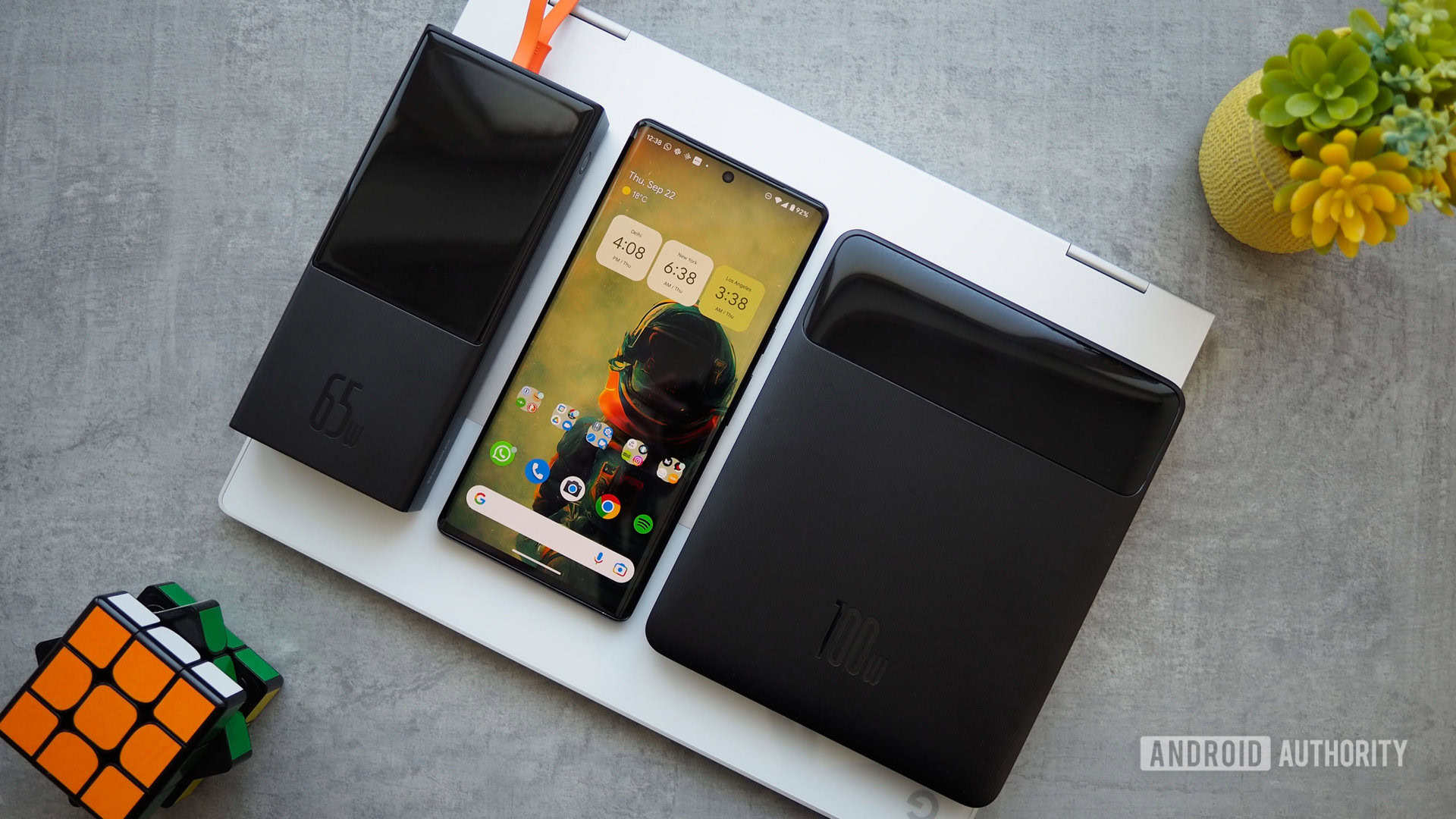
Finding a good power bank is both a simple and complicated matter these days. Choices are unlimited and odds are you’ll get something that does the job, no matter what you pick. But the multitude of charging protocols, power inputs and outputs, and ports means that you’ll be a bit confused by all of it.
I’ve been meaning to upgrade from my 18W 10,000mAh Anker battery for about a year, but I kept delaying the decision until I could get a replacement that’d provide a significant upgrade. The choices I settled on? Two power banks from Baseus — a Xiaomi sister brand — that each serve a different purpose.
One of them has become my go-to travel battery because of its super convenient built-in USB-C cable; the other is my mobile work savior, helping me do my job on my five-year-old Pixelbook’s dying battery for an entire day. Let me explain.
Our picks: The best USB-C portable battery chargers
Baseus Blade 100W 20,000mAh power bank
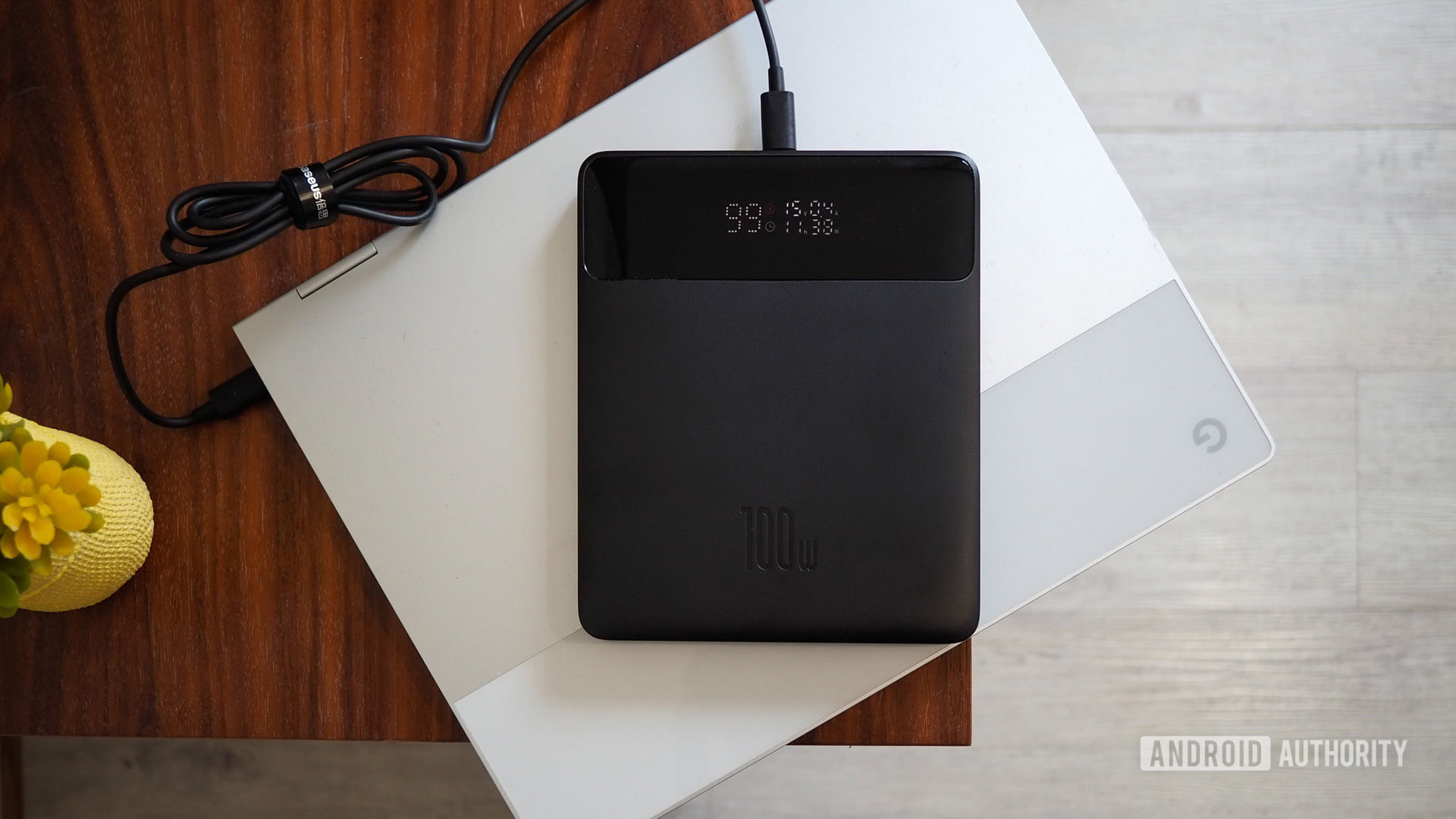
The Blade ($99.99) caught my eye because of it eschews the thick, boxy form factor for a flatter design. It looks like two 10,000mAh laid out next to each other, not on top of each other. The volume — or footprint if you will — is very similar to any other 20,000mAh battery, but the thinner layout makes it more practical to carry in laptop sleeves.
It's thin enough to go into a laptop or tablet sleeve without causing a big bump.
I can easily slide it next to my Pixelbook in the flat compartments of my backpack. Sure, it’s bumpier than a tablet or laptop for example, but not as much as a traditional power bank. But enough about the form factor, let’s talk specs.
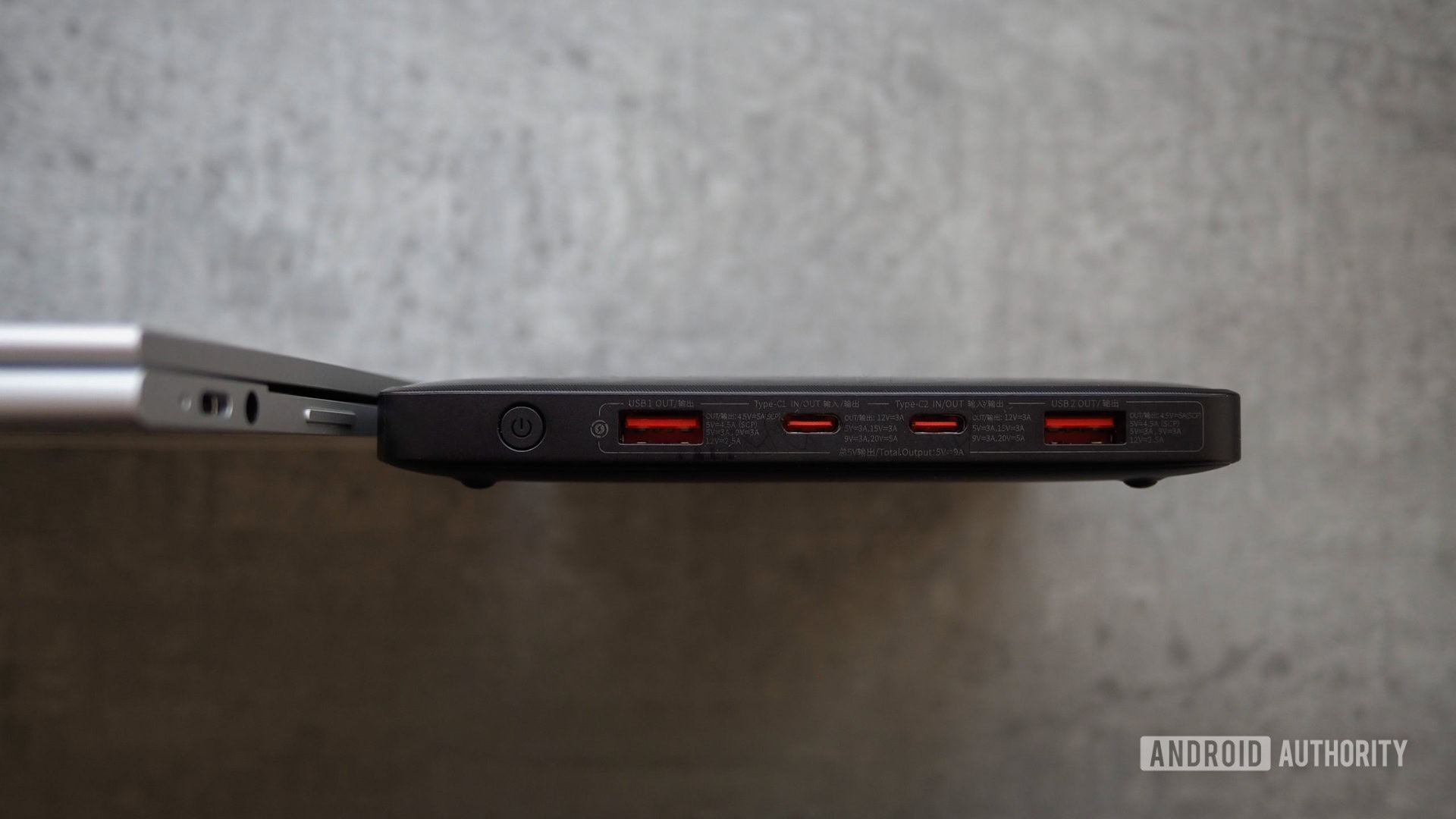
All the ports sit on the same side. You get two identical USB-C 3.0 PD PPS ports that serve double duty as input and output. Input maxes out at 65W, output at 100W per port. Next to them are two USB-A ports that can go up to 18W. If you use all ports together, you get 100W of maximum output power.
When my Pixelbook is near-depleted, the Blade goes up to 15V/3.8W (57W) — close enough to the laptop’s maximum 60W charging speed. That leaves about 40W of free power that I can use to charge my Pixel 6 Pro and a couple of accessories like my Galaxy Watch or Nothing Ear (1).
The display conveniently shows all the stats you need: capacity, charging power, and time remaining.
How did I know the charging speed? Well, there’s a convenient LED display that shows it. It presents the current capacity percentage (98% in the image below), charging power (15V/1.1A), and time remaining for the battery to deplete at the current output power (2 hours and 25 minutes). When I’m charging the Blade, the display shows the speed at which it’s filling up and how long it’ll take to get to 100%.
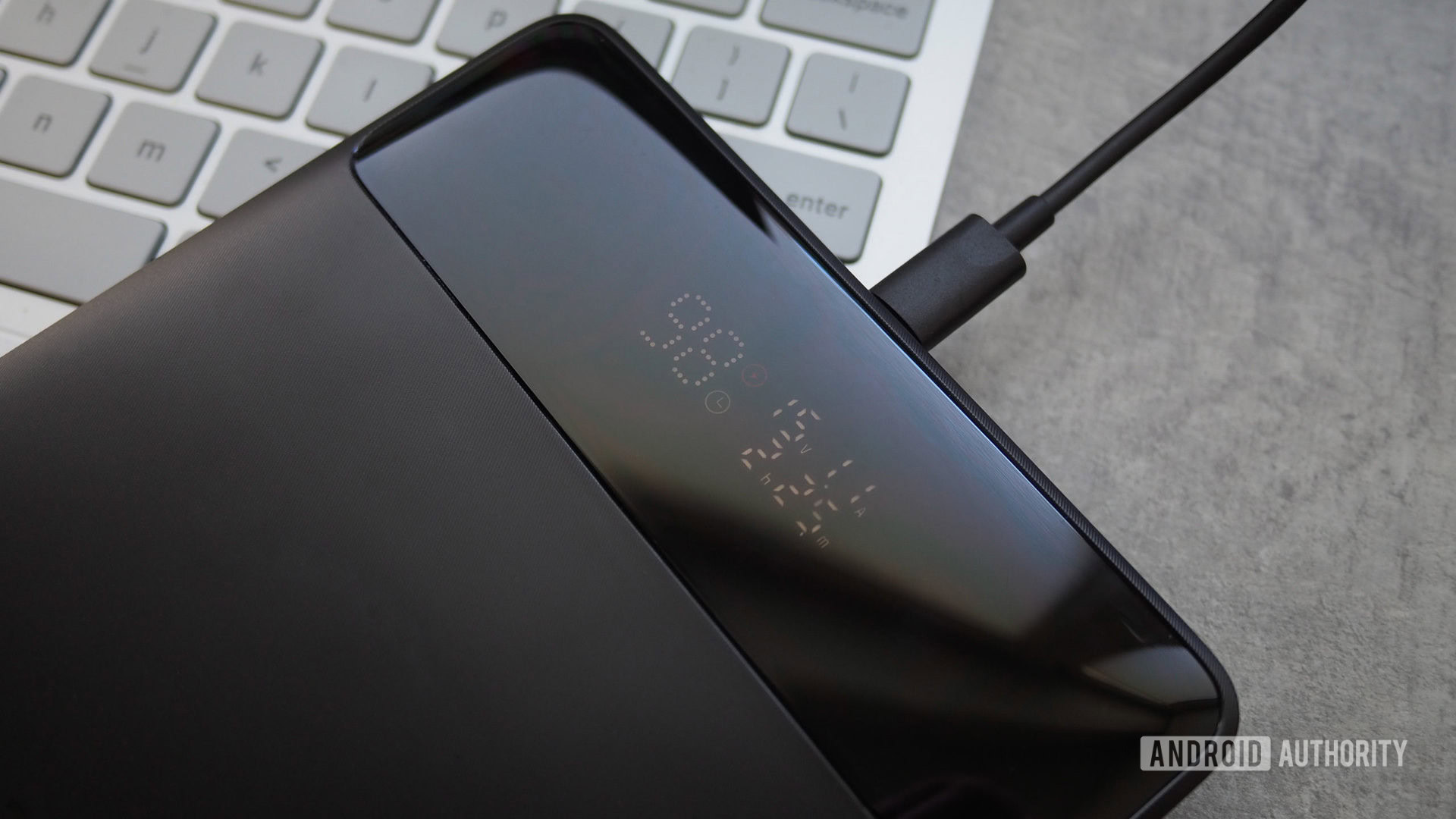
For the past month, I’ve had to work in a few less-than-ideal environments where I didn’t always have access to a power outlet. You don’t know what the word ‘territorial’ means until you’ve seen someone scowl at you because you dared glance at their prised outlet in a cafe, airport, or press center.
It helps me keep my five-year-old Pixelbook's going for an entire day of work.
The abused battery of my Pixelbook isn’t what it was five years ago, so the Blade saved me several times. I could charge my Pixelbook twice a day and keep working for several hours in a row, uninterrupted, and without scouring for a free outlet every five minutes. Since I don’t plan on upgrading my laptop anytime soon, I imagine this Baseus power bank will have to play a bigger role over the next months — maybe even year or two.
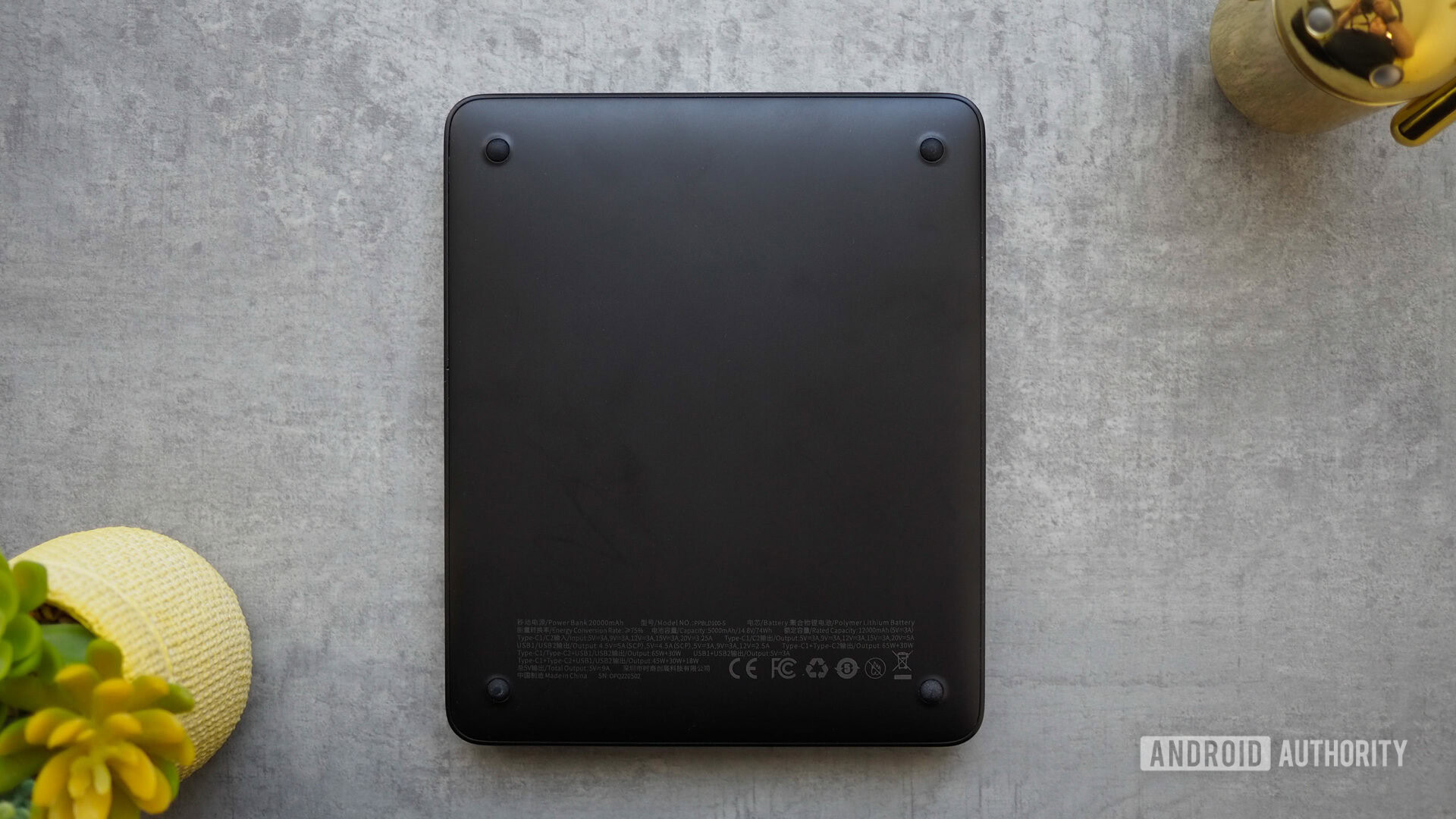
But perhaps my favorite feature is one that isn’t unique to this particular unit. Some of you may not know, but most power banks support pass-through charging, i.e. you can plug them into a wall charger and plug all of your devices into the battery. It starts by letting the power through to your devices first (pass-through) and then charges itself. This is perfect for night-time charging on busy work trips.
It’s even more awesome when your hotel or Airbnb doesn’t happen to have an outlet near the bed and you don’t have an extension cord. I was in that situation recently, so I used a long 10ft (3m) USB-C cable to connect my wall charger to the Blade, which I placed on the bedside table. Now I had a charger next to me, instead of on the other side of the room, and I could plug my phone, watch, and earbuds in it. Convenient and more practical than carrying an extra extension cord.
Pass-through charging is super convenient, whereas 70% of efficiency is disappointing.
The only qualm I have about the Blade is that its efficiency isn’t stellar. Power bank brands often claim big numbers like 20,000mAh and 30,000mAh, but they usually provide 80-85% of that. In the Blade’s case, two full charges of my Pixelbook while not in use (2 x 5600mAh) drop the battery down to 20%. That means we’re looking at approximately 14,000mAh of real capacity — 70% of the 20,000mAh Baseus claims. It still does the job for me and my use, but I wish it was more efficient and could eke out 2-3,000mAh more from it.

Baseus 65W 20,000mAh power bank with built-in USB-C cable
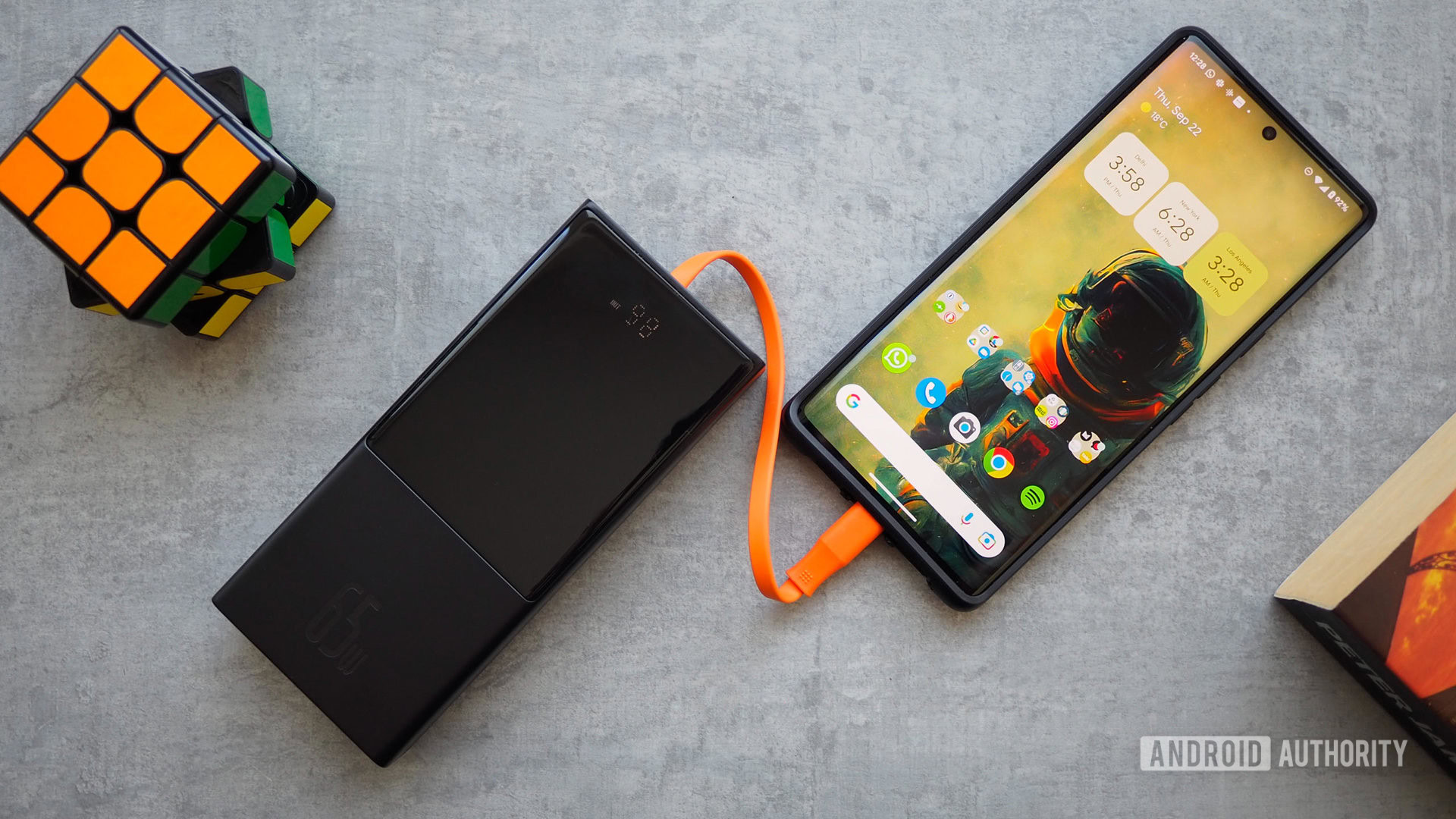
The second 65W charger ($59.99) is a bit less impressive on paper, but it won me over because of one very simple feature: a built-in USB-C cable that stows away when not in use. (The fun orange color helped a bit too.)
The USB-C cable is built in so you don't have to remember to pack it separately.
I can’t really explain this fascination I have with built-in cables, but the idea of not having to remember and carry a separate cable just appeals to me. I’ve had power banks with built-in cables since the Micro-USB days, and I’m very happy to finally have one with USB-C now.
Unlike the Blade, we’re looking at a more traditional brick form factor here with two 18W USB-A ports and one input/output USB-C 65W port. The orange USB-C cable serves as output only (sadly) and goes up to 65W too.
The display is smaller but still shows all the information you need.
The LED display is smaller and only shows one stat at a time. A power button on the side switches between showing the current percentage, charging amperage, and voltage. Again, the battery’s efficiency isn’t stellar, but it seems to be a bit better than the Blade. I measured it at about 75%, i.e. 15,000mAh of output capacity.
Check out: The best 20,000mAh power banks you can buy
While this can technically charge up my Pixelbook just as fast and often as the Blade, I prefer to carry it on trips where I don’t have my laptop and don’t need to do actual work. The 65W of total output is better suited for a combination of less power-hungry devices — say my phone, tablet, watch, and earbuds.
This is the ideal power bank for long vacations days or people who carry backpacks.
It’s the ideal on-the-go battery for vacations and everyday backpack carriers: powerful enough to charge up two phones or tablets plus two accessories simultaneously, large enough to charge a phone three to four times, and always ready with a built-in cable. It now goes into my backpack each time I set out for a long day, no questions asked. And unlike my older 10,000mAh power bank, I know it won’t be depleted in one day so I don’t need to recharge it daily.

Thank you for being part of our community. Read our Comment Policy before posting.